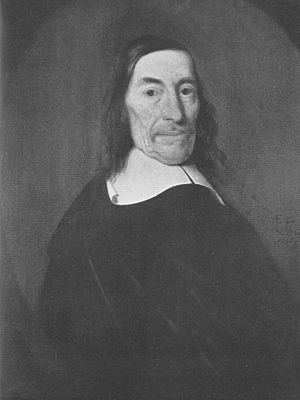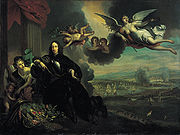
De Witt (family)
Encyclopedia



Patrician
The term patrician originally referred to a group of elite families in ancient Rome, including both their natural and adopted members. In the late Roman Empire, the class was broadened to include high council officials, and after the fall of the Western Empire it remained a high honorary title in...
and regenten
Regenten
In the 16th, 17th and 18th centuries, the regenten were the rulers of the Dutch Republic, the leaders of the Dutch cities or the heads of organisations . Though not formally a hereditary "class", they were de facto "patricians", comparable to that ancient Roman class...
family. Originally of Dordrecht
Dordrecht
Dordrecht , colloquially Dordt, historically in English named Dort, is a city and municipality in the western Netherlands, located in the province of South Holland. It is the fourth largest city of the province, having a population of 118,601 in 2009...
s origin, the genealogy of the family begins with Jan de Witte, a patrician who lived around 1295. The family have played an important role during the Dutch Golden Age
Dutch Golden Age
The Golden Age was a period in Dutch history, roughly spanning the 17th century, in which Dutch trade, science, military and art were among the most acclaimed in the world. The first half is characterised by the Eighty Years' War till 1648...
. They were at the centre of Dordrecht and Holland oligarchy from the end of the 16th century until 1672.
The De Witt family during the Dutch Golden Age
During the Dutch Golden AgeDutch Golden Age
The Golden Age was a period in Dutch history, roughly spanning the 17th century, in which Dutch trade, science, military and art were among the most acclaimed in the world. The first half is characterised by the Eighty Years' War till 1648...
, the De Witt family was very critical of the influence of the House of Orange-Nassau
House of Orange-Nassau
The House of Orange-Nassau , a branch of the European House of Nassau, has played a central role in the political life of the Netherlands — and at times in Europe — since William I of Orange organized the Dutch revolt against Spanish rule, which after the Eighty Years' War...
. They belonged to the republican
Republicanism
Republicanism is the ideology of governing a nation as a republic, where the head of state is appointed by means other than heredity, often elections. The exact meaning of republicanism varies depending on the cultural and historical context...
political movement, also referred to as the ‘state oriented’, as opposed to the Royalist
Royalist
A royalist supports a particular monarch as head of state for a particular kingdom, or of a particular dynastic claim. In the abstract, this position is royalism. It is distinct from monarchism, which advocates a monarchical system of government, but not necessarily a particular monarch...
s. Together with the Republican political leaders at Dordrecht, the Van Slingelandts, and at Amsterdam the leading Bicker family
Bicker family
Bicker is a very old Dutch patrician family . The family have played an important role during the Dutch Golden Age. They were at the centre of Amsterdam oligarchy from the begin of the 17th century until the early 1650s...
and their relatives of the family De Graeff
De Graeff
De Graeff is an old Dutch patrician family. The family have played an important role during the Dutch Golden Age. They were at the centre of Amsterdam public life and oligarchy from 1578 until 1672...
, the De Witts strove for the abolition of stadtholder
Stadtholder
A Stadtholder A Stadtholder A Stadtholder (Dutch: stadhouder [], "steward" or "lieutenant", literally place holder, holding someones place, possibly a calque of German Statthalter, French lieutenant, or Middle Latin locum tenens...
ship. They desired the full sovereignty of the individual regions in a form in which the Republic of the United Seven Netherlands
Dutch Republic
The Dutch Republic — officially known as the Republic of the Seven United Netherlands , the Republic of the United Netherlands, or the Republic of the Seven United Provinces — was a republic in Europe existing from 1581 to 1795, preceding the Batavian Republic and ultimately...
was not ruled by a single person. Instead of a sovereign (or stadtholder), the political and military power was lodged with the States General and with the regents of the cities in Holland.
During the two decades from the 1650 to the 1670s the De Witt family had a leading role in the Dutch administration. This period was also referred to by Republicans as the Ware Vrijheid (True Freedom), the First Stadtholderless Period
First Stadtholderless Period
The First Stadtholderless Period or Era is the period in the history of the Dutch Republic in which the office of a Stadtholder was absent in five of the seven Dutch provinces...
which lasted from 1650 to 1672.
In Rampjaar
Rampjaar
The rampjaar was the year 1672 in Dutch history. In that year,the Republic of the Seven United Provinces was after the outbreak of the Franco-Dutch War and the Third Anglo-Dutch War attacked by England, France, and the prince-electors Bernhard von Galen, bishop of Münster and Maximilian Henry of...
1672, when the Orangists
Orangism (Netherlands)
Orangism is a monarchist political support for the House of Orange-Nassau as monarchy of the Netherlands. It played a significant role in the political history of the Netherlands since the Dutch revolt...
took power again and the brothers Johan
Johan de Witt
Johan de Witt, heer van Zuid- en Noord-Linschoten, Snelrewaard, Hekendorp and IJsselveere was a key figure in Dutch politics in the mid 17th century, when its flourishing sea trade in a period of globalization made the United Provinces a leading European power during the Dutch Golden Age...
and Cornelis de Witt
Cornelis de Witt
Cornelis de Witt was a Dutch politician.-Biography:Cornelis de Witt was a member of the old Dutch patrician family De Witt. He was born on 15 June 1623 in Dordrecht, Holland, Dutch Republic...
were murdered, the family lost their position as one of the key States party families. In 1861 the family died out with Maria de Witt.
Family members
- Jacob Fransz de Witt (1548-1621), Burgemeester of Dordrecht, member of the States of Holland
- Cornelis Fransz de Witt (1545–1622), Burgemeester and regent of Dordrecht, member of the States of Holland and West Friesland
- Andries de WittAndries de WittAndries de Witt was Grand Pensionary of Holland between 1619 and 1621. He was the successor of Johan van Oldebarnevelt, who had been executed in 1619....
(1573–1637), Grand PensionaryGrand PensionaryThe Grand Pensionary was the most important Dutch official during the time of the United Provinces. In theory he was only a civil servant of the Estates of the dominant province among the Seven United Provinces: the county of Holland...
of Holland - Jacob de WittJacob de WittJacob de Witt, heer van Manezee, Melissant and Comstryen was a burgomaster of Dordrecht and the son of a timber merchant. He was also a younger brother of Andries de Witt and the father of Johan and Cornelis de Witt.-Career:Jacob was a member of the French patrician family De Witt...
(1589–1674), Burgemeester and regent of Dordrecht, member of the States of Holland- Johan de Witt (1618-1676), Burgemeester and regent of Dordrecht
- Cornelis de WittCornelis de WittCornelis de Witt was a Dutch politician.-Biography:Cornelis de Witt was a member of the old Dutch patrician family De Witt. He was born on 15 June 1623 in Dordrecht, Holland, Dutch Republic...
(1623–1672), Burgemeester and regent of Dordrecht, ruwaard or governorGovernorA governor is a governing official, usually the executive of a non-sovereign level of government, ranking under the head of state...
of the land of PuttenVoorne-Puttenthumb|225px|right|Satellite image of the [[Rhine]]-[[Meuse river|Meuse]] [[river delta|delta]], showing the island of Voorne-Putten Voorne-Putten is an island between the North Sea, the Brielse meer and the rivers Oude Maas, Spui and Haringvliet in the province of South Holland in the Netherlands...
, chief of the Dutch marine- Johan de WittJohan de WittJohan de Witt, heer van Zuid- en Noord-Linschoten, Snelrewaard, Hekendorp and IJsselveere was a key figure in Dutch politics in the mid 17th century, when its flourishing sea trade in a period of globalization made the United Provinces a leading European power during the Dutch Golden Age...
(1625–1672), heer van Zuid- en Noord-Linschoten, Snelrewaard and IJsselveere, Grand Pensionary of Holland- Johan de Witt Jr. (1662–1701), heer van Zuid- en Noord-Linschoten, Snelrewaard and IJsselveere, secretary of the city of DordrechtDordrechtDordrecht , colloquially Dordt, historically in English named Dort, is a city and municipality in the western Netherlands, located in the province of South Holland. It is the fourth largest city of the province, having a population of 118,601 in 2009...
- Cornelis Johansz de Witt (1696-1769), vrijheer van JaarsveldJaarsveldJaarsveld is a town in the Dutch province of Utrecht. It is a part of the municipality of Lopik, and lies about 7 km southwest of IJsselstein....
, Burgemeester of Dordrecht, member of the States of Holland
- Cornelis Johansz de Witt (1696-1769), vrijheer van Jaarsveld
- Johan de Witt Jr. (1662–1701), heer van Zuid- en Noord-Linschoten, Snelrewaard and IJsselveere, secretary of the city of Dordrecht
- Johan de Witt
- Andries de Witt
Literature
- Sypesteyn, C.A. van, De geslachten De Witt te Dordrecht en te Amsterdam in: De Nederlandsche heraut. Tijdschrift op het gebied van geslacht-, wapen- en zegelkunde jrg. 3 (1886 's-Gravenhage; C. van Doorn & zoon).
- Panhusen, Luc (2005) De Ware Vrijheid, De levens van Johan en Cornelis de Witt, Atlas
- Rowen, Herbert H. (1986) John de Witt – Statesman of the True Freedom“ Cambridge University Press. ISBN 0-521-52708-2.
- Fölting, H.P., De landsadvocaten en raadpensionarissen der Staten van Holland en West-Friesland 1480–1795. Een genealogische benadering. Deel III in: Jaarboek Centraal Bureau Voor Genealogie. Deel 29 (1975 Den Haag; Centraal Bureau Voor Genealogie).
- Israel, Jonathan I. (1995) The dutch Republic – It`s Rise, Greatness, and Fall - 1477-1806 Clarendon Press, Oxford, ISBN 978-0-19-820734-4.

